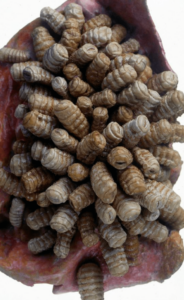Gasterophilus intestinalis, commonly known as the horse bot fly, poses a significant threat to the health of horses. These parasitic insects lay their eggs on the horse’s coat, which are then ingested when the horse licks or grooms itself.
Once hatched, the larvae can cause discomfort, itching, and internal damage. To safeguard your horse from these pests and maintain their well-being, it is crucial to take effective preventive measures. Below are various strategies to protect your equine companion from horse bot flies:

- Regular Grooming: Routine grooming not only keeps your horse looking its best but also helps remove bot fly eggs from its coat. Use a grooming mitt or brush to eliminate any eggs or larvae.
- Understand the Life Cycle: Horse bot flies are most active during warmer months. Understanding their life cycle can help you anticipate their presence and take necessary precautions.
- Fly Repellents: Use equine-safe fly repellents to deter horse bot flies. Follow the manufacturer’s instructions and reapply as needed.
- Fly Sheets and Masks: Equipping your horse with a fly sheet and fly mask shields them from the sun and biting insects and acts as a barrier against bot fly eggs.
- Maintain Clean Environments: Regularly clean your horse’s living spaces, including stalls and pastures, to reduce the number of locations where flies can deposit their eggs.
- Hygiene: To minimize fly attraction, provide a clean and sanitary environment for your horse, including clean water troughs and feed buckets.
- Deworming Strategy: Collaborate with your veterinarian to establish a deworming regimen tailored to your horse’s needs. Certain deworming medications are designed to target and eliminate botfly larvae in the horse’s stomach.
- Manual Egg Removal: Use a bot knife or specialized grooming tools to manually remove bot fly eggs from your horse’s coat, paying close attention to areas where flies tend to lay eggs.
- Pasture Rotation: Regularly changing pastures disrupt the bot fly life cycle, reducing their prevalence in your horse’s environment.
- Supplementation: Some horse owners explore the use of garlic or apple cider vinegar supplements in their horse’s diet as potential fly deterrents. Further research is needed to confirm their effectiveness.
- Bot Fly Traps: Consider using bot fly traps to capture adult flies before they lay eggs on your horse. Proper trap placement can help reduce the local fly population.
- Consult Your Veterinarian: If you suspect your horse has been infested with bot fly larvae, consult your veterinarian for guidance on suitable treatment options, including deworming medications and additional measures to address the issue.
To effectively protect your horse from Gasterophilus intestinalis, a combination of vigilant care, strategic planning, and preventive actions is essential. Each horse may have unique needs, so working closely with your veterinarian to develop a tailored plan is crucial.
By staying informed about the bot fly’s life cycle and implementing the techniques outlined above, you can reduce the risk of infestation and ensure your horse remains healthy and comfortable.


